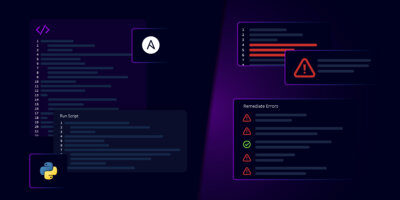Share this

Table of Contents
Automation is supposed to make networking easier, faster, and more reliable — but too often, teams find themselves spending more time troubleshooting automation failures than they did managing networks manually.
Why? Because most automation efforts assume everything will work perfectly.
We see this all the time. A script is written to execute a change, but what happens when a device is unreachable? When an API times out? When a configuration only partially applies? Without built-in error handling, automation doesn’t reduce operational overhead — it increases it.
This isn’t just a minor inconvenience. Poor error handling in automation slows down adoption, reduces trust, and ultimately prevents teams from scaling their efforts. If engineers don’t feel confident that automation will work every time — even when things go wrong — they’ll revert to manual processes, defeating the entire purpose of automating in the first place.
Why Error Handling is the Biggest Barrier to Scalable Automation
When teams first start automating, they focus on getting scripts to work — which makes sense. But there’s a big difference between writing a script that runs and building an automation framework that operates reliably at scale.
When error handling is ignored:
- Engineers have to manually monitor automation instead of trusting it to run independently.
- Failures create network inconsistencies, leading to misconfigured devices and operational risk.
- Automation adoption slows down because teams can’t rely on it to work under real-world conditions.
This is where most teams get stuck: Automation is valuable, but only when it’s resilient. Without error handling, it becomes fragile — just another thing that can break.
How the Itential Platform Solves Automation Failure at Scale
At Itential, we’ve worked with network teams at every stage of automation maturity, and one of the biggest lessons we’ve learned is this: Automation must be designed to handle failure, or it won’t scale.
That’s why the Itential Platform is built to ensure automation is predictable, resilient, and repeatable — so engineers can focus on driving efficiency instead of troubleshooting automation failures.
Here’s how Itential mitigates automation failures and ensures error handling is built into every workflow:
1. Automated Pre-Checks & Validation
Most automation failures happen before execution even starts — because a device is unreachable, a config is missing, or a required input is incorrect. The Itential platform automatically validates inputs and checks network state before making changes, ensuring automation doesn’t break due to bad data.
2. Intelligent Error Handling & Rollback
Instead of automation failing mid-process, Itential detects issues in real time and provides built-in rollback and retry capabilities. If a configuration push fails or a service is unreachable, Itential ensures the network returns to a stable state.
3. Real-Time Execution Tracking & Logging
When automation fails, teams need immediate visibility. The Itential platform provides detailed execution tracking, logging, and real-time alerts so engineers can quickly diagnose and resolve issues — without manually searching through logs.
4. Enterprise-Scale Orchestration with Built-In Governance
One-off scripts don’t include error handling because they weren’t designed to scale. The Itential platform provides a structured orchestration layer that ensures automation is governed, validated, and safe to run across the enterprise.
The result? Automation that is reliable, trusted, and scalable
Building Automation That Teams Can Trust
If automation only works when everything goes right, it’s not automation — it’s just scripting.
To scale automation, teams need to ensure that:
✅ Network state is validated before making changes
✅ Automation can recover from failures without manual intervention
✅ Engineers have real-time visibility into automation execution
This is how network teams evolve from building automation for themselves to delivering automation as a service that IT can trust.
With the Itential platform, teams don’t have to worry about fragile automation and manual troubleshooting — instead, they can focus on scaling resilient, predictable, and fully governed automation across the enterprise.
Want to eliminate automation failures and scale network automation with confidence? Learn more about the Itential platform or listen to the full convo with my friend Peter Sprygada on a recent Packet Pushers podcast.



